
A Frightening New Role in Public Health
Secretary of Health and Human Services Robert F. Kennedy Jr., a controversial figure who has previously led a children's anti-vaccine organization and gained notoriety for promoting conspiracy theories, is now being called a "foremost" global health expert by White House Deputy Chief of Staff Stephen Miller. This endorsement has ignited a firestorm of criticism, particularly given Kennedy's lack of formal training or degrees in medicine or public health.
The Call for Credibility in Public Health
Miller's assertion that the CDC's credibility was shattered during the COVID-19 pandemic raises significant questions about the qualifications of those leading public health initiatives. While the CDC has indeed faced criticism, endorsing an individual like Kennedy to restore that credibility may further undermine trust among healthcare professionals and the public.
Challenging Established Knowledge
Kennedy's recent comments on his ability to detect health issues in children simply by observing their body language and faces only heighten skepticism about his expertise. Such claims have been met with swift backlash from medical experts, including the Lincoln Project, which emphasized that labeling him as a public health expert is disingenuous at best. As we navigate a landscape where misinformation spreads rapidly, the implications of appointing leaders without credible backgrounds in health become more pressing.
Counterarguments and Diverse Perspectives
Despite the uproar, Miller continues to praise Kennedy as a significant figure in the Trump administration, positioning him as someone who is working to address public health crises. However, critics argue that this perspective is rooted in political aims rather than legitimate public health strategies. With the CDC's ongoing adjustments in leadership and policy, how Kennedy’s presence will affect these changes remains uncertain.
Implications for Public Health Policy
The ongoing tension reflects not just a clash of personality but a deeper ideological battle regarding the direction of public health policy in the United States. As the Biden administration seeks to recover from the pandemic's fallout, the endorsement of individuals lacking proper qualifications could hinder efforts toward national health reform and equity.
The Future of Public Health Leadership
The appointment of Kennedy signifies a potential shift in the approach to public health in the U.S., raising questions about the integrity of policies shaped by non-experts. The implications for public trust are significant—should policymakers prioritize scientific expertise, or is there room for a more populist approach that values personal beliefs over established science?
For civil rights and immigration attorneys, the unfolding public health narrative has reverberating consequences, especially regarding the health policies affecting vulnerable populations. It is essential to arm oneself with knowledge on how these developments may impact legislative changes within the realm of health rights.
It is important to stay informed about these evolving discussions to advocate effectively for justice and equality in health initiatives. Continued engagement with credible sources and ongoing education in public health is necessary for those who fight for civil and immigration rights. Be an advocate for science-based approaches to public health that serve the needs of all communities.
 Add Row
Add Row  Add
Add 




Write A Comment